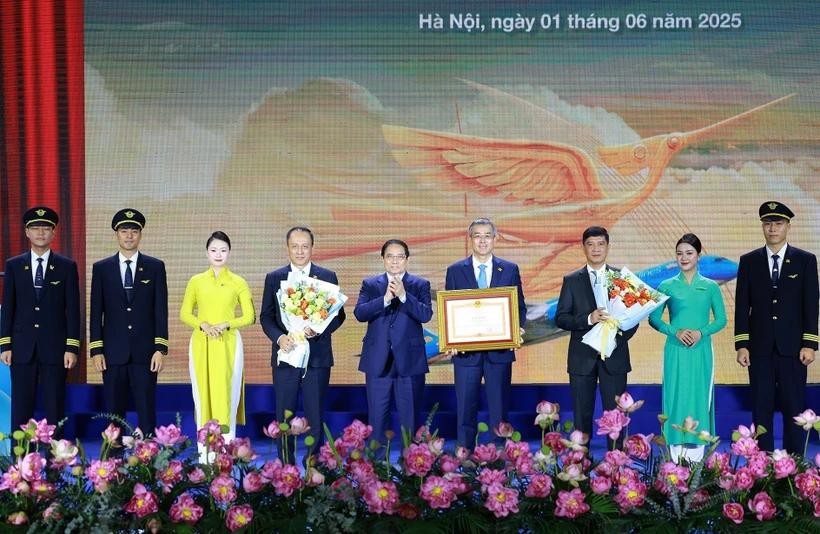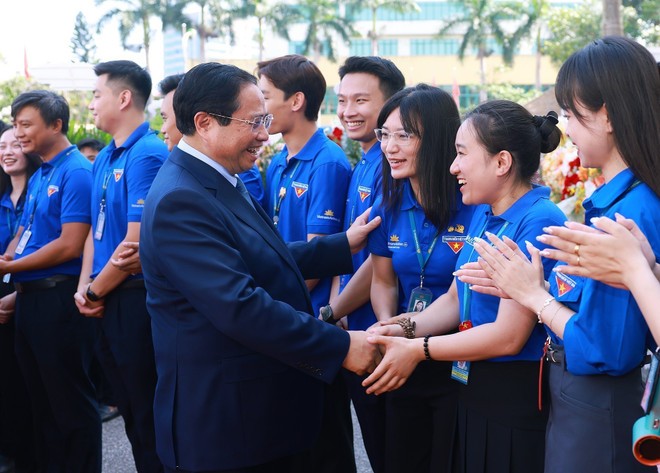
National flag carrier Vietnam Airlines must follow a path of modern, green, sustainable, and safe development and build a distinctive cultural identity rooted in the core cultural values of the Vietnamese nation.
Prime Minister Pham Minh Chinh requested a ceremony in Hanoi on June 1 to celebrate the airlines’ 30th founding anniversary (May 27, 1995 - May 27, 2025).
Presenting the Prime Minister’s certificate of merit to the airline for outstanding contributions to national development and international integration, the leader praised the airline for fulfilling its role as the national flag carrier and a leading force in the aviation industry.
More than just an economic enterprise, Vietnam Airlines serves national development, tourism, cultural exchange, and international integration. It also plays a role in national defense, public service, and humanitarian missions, most notably during the Covid-19 pandemic, he said.
“Vietnam Airlines plays a core role in fulfilling the country’s political, defense, social welfare, and diplomatic missions – from emergencies to events of national importance,” he added.
Over the past 30 years, Vietnam Airlines has stood side by side with the nation, especially during its most difficult moments. These include the evacuation campaign for Vietnamese citizens in Libya, repatriation flights for those affected by the earthquake and tsunami in Japan, and hundreds of humanitarian flights during the Covid-19 pandemic, according to the PM.
From an airline with a small fleet and limited facilities, Vietnam Airlines has risen to become a four-star airline by international standards. Over three decades of operation, the airline has served 350 million passengers, transported 4.7 million tonnes of cargo, operated nearly 100 routes to 53 domestic and international destinations, and connected to more than 1,000 global destinations through the SkyTeam alliance.
The airline’s revenue has continued to grow, with total contributions to the State budget from the parent company and its subsidiaries reaching approximately VND68 trillion (US$2.6 billion) between 1995 and 2024, three times the State’s initial capital investment.
In 2024 alone, Vietnam Airlines achieved a consolidated revenue of nearly VND113 trillion, with a record consolidated post-tax profit of over VND7.9 trillion.
Dang Ngoc Hoa, Chairman of the Board of Directors of Vietnam Airlines, said with the goal of becoming a five-star international airline by 2030, Vietnam Airlines will continue to modernize its fleet, expand its route network, develop personalized services, and apply new technologies.
The airline has identified people as the core of its development strategy, placing a strong emphasis on building a high-quality workforce with competence, knowledge, and a dedicated service spirit capable of meeting the demands of deep international integration, he said.

Looking ahead, PM Chinh instructed Vietnam Airlines to closely monitor global trends to seize development opportunities, constantly innovate, and harness not only internal synergies but also the collective strength of society and the broader business community.
He called on the airline to think big, act boldly, and expand its reach across all five continents, enhancing Vietnam’s soft power through global connectivity in economy, culture, tourism, and people-to-people exchange.
The Government leader also urged the carrier to accelerate comprehensive restructuring, make efficient use of State-supported resources in accordance with the law, invest in modern infrastructure, and enhance service quality.
He stressed the importance of building a high-caliber, professional, and passionate workforce to meet increasing service demands.
“The airline should apply modern management models, fully embrace the digital transformation, and enhance customer service and experience while reducing operational costs to remain globally competitive,” he said.
























